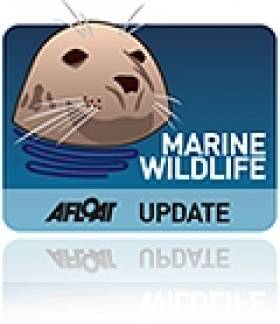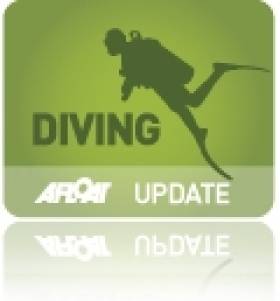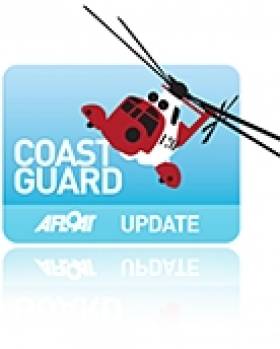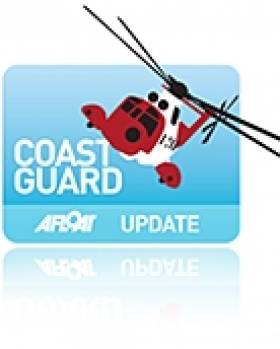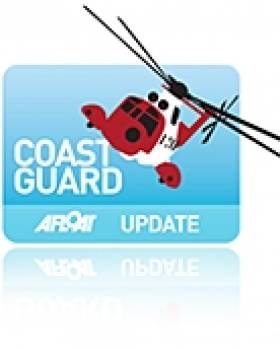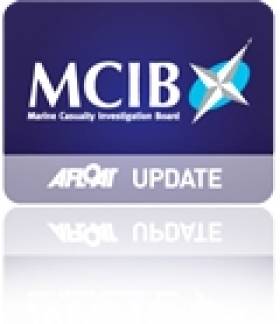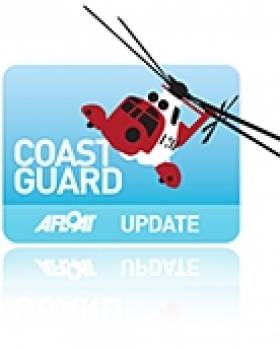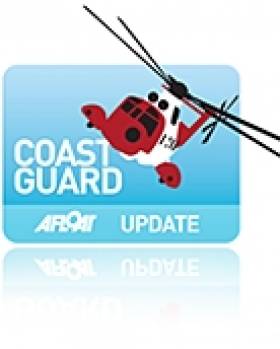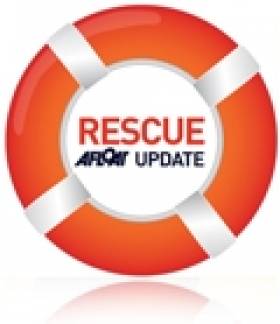Displaying items by tag: Malin Head
Galway Gardaí Come To The Rescue of Stranded Baby Seal
#MarineWildlife - Gardaí in Galway were on hand to rescue a stranded baby seal at Weightman's Pier in the city on Friday 4 July.
As TheJournal.ie reports, gardaí said the young seal, estimated to be four weeks old, was found "in poor condition and would not have made it through the night" if not for treatment by a local vet.
Here's hoping the little one makes a full recovery.
Elsewhere in Ireland, tourists at Malin Head have been treated to some spectacular displays by as many as 50 dolphins in an area already renowned for regular killer whale and basking shark sightings.
Indeed, Independent.ie reporting that local boat charters are being inundated with requests for dolphin-spotting trips.
Man Dies In North-West In Weekend's Second Diving Tragedy
#Diving - BBC News reports on a second diving tragedy this weekend, after one of a group of divers got into difficulty off Malin Head in Co Donegal yesterday morning (15 June).
The casualty is believed to have made a rapid ascent from 45 metres and reached the surface unconscious.
The Polish national was airlifted by Irish Coast Guard helicopter to Altnagevin Hospital in Derry-Londonderry within an hour of the incident but was pronounced dead on arrival.
It comes less than 24 hours after a Limerick man died while diving near Roches Point in Cork Harbour, as previously reported on Afloat.ie.
Marine Safety Changes 'Unwise And Unsafe' Says Coastguard Chief
#Coastguard - Proposals to cut Malin Head's coastguard watches from round-the-clock to just 12 hours threaten to “to tear up 30 years of progress” in marine safety, as The Irish Times reports.
The statement by Irish Coast Guard chief Chris Reynolds comes from documents released under the Freedom of Information Act that outline his organisation's and the Marine Survey Office's stance against the Department of Transport's planned reorganisation of Ireland's maritime safety network in the wake of last year's 'value for money' report.
Reynolds also described as "unwise and unsafe" planned cuts to staffing levels across the coastguard network that would see volunteer units reduced from 49 to 42 when current levels are already operating at half that as recommended in the UK.
More than a year ago it was announced that the coastguard radio stations at Malin Head and Valentia would remain open following the threat of closure to one or both under consolidation proposals being evaluated by Transport Minister Leo Varadkar.
Since then the Government has already approved next year's merger of the Irish Coast Guard and the Marine Survey Office under a single administrative body to be known as the Irish Maritime Administration (IMA).
However, the documents seen by the IT show both organisation's concerns over intentions to demote Malin and Valentia to sub-station status below a main control centre in Blanchardstown, west Dublin, within the minister's constituency - as well as what Reynolds calls a "dumbing down" of activity via giving civil servants more control over maritime policy.
The Irish Times has much more on this story HERE.
Abandoned Yacht Surprises Donegal Skipper
#GhostShip - It was an unsettling discovery for a Donegal skipper to happen upon a deserted yacht drifting in the Atlantic Ocean last week.
As BBC News reports, the unmanned vessel materialised in fog off Downings harbour in the north-west of the county, evoking memories of the famous Mary Celeste.
Fearing the worst, local charter boat operator Michael McVeigh sent two divers abroad to investigate, and all they found were rotting food and an e-mail address left on a note on the table.
But the mystery was soon solved after McVeigh contacted Malin Head coastguard - who confirmed that the yacht's owner had been rescued some 600 miles west of Galway.
The yachtsman had been sailing on a "dream trip" from his home in the Azores towards Iceland when he encountered difficulties and used his satellite phone to call for help.
He was later picked up by a passing freighter, leaving his yacht to drift.
BBC News has more on the tale here.
MLA Dallat Welcomes Malin Head Reprieve
#Coastguard - East Londonderry MLA John Dallat has welcomed the news that the Irish Coast Guard station at Malin Head will remain open.
The SDLP politician had previously sought the support of Northern Ireland's Minister of State Mike Penning to help protect the Donegal coastguard station from closure in the wake of the 'value for money' report commissioned by Irish Transport Minister Leo Varadkar.
Last week Minister Varadkar made a U-turn on proposals to close one or both of the stations at Malin Head and Valentia Island in Co Kerry, following vocal protests by coastal communities in both areas.
As BBC News reports, Dallat's interest in Malin Head dates back to 1973, when he met divers salvaging items from the wreck of the Titanic sister ship Laurentic, which was sunk by mines off Lough Swilly in 1917.
Dallat joined the crew to salvage for brass and copper machinery from the wreck, but on the way to the site their boat experienced engine trouble.
It was only by contacting Malin Head that they were able to receive assistance from a passing coal boat - and Dallat believes he would not be here today if not for that coastguard radio call.
BBC News has more on the story HERE.
Valentia and Malin Head Coastguard Stations Will Not Be Closed Says Minister
#COASTGUARD - BreakingNews.ie reports that the coastguard stations at Malin Head and Valentia will remain open, following a statement to the Dáil by the Minister for Transport this evening.
Coastal communities in Donegal and Kerry had been protesting against plans to close their respective Irish Coast Guard radio stations in the wake of the 'value for money' report commissioned earlier this year by the office of Transport Minister Leo Varadkar.
Both stations were earmarked for potential closure amid concerns that the minister was allegedly looking at an "alternative technical solution" within his own constituency in Blanchardstown.
However this evening Minister Varadkar assured local communities that their coastguard centres would not be closed, while also expressing disappointment at the treatment of officials from his department at a recent joint committee meeting on the matter.
Meanwhile, the Save Our Station campaign group at Valentia has welcomed the news, telling RTÉ News that "common sense has prevailed".
Spokesperson Anthony O'Connell said that he hoped the minister's move marked the end of any threat to the future of the stations at Valentia and Malin Head.
The news comes just two weeks after an East Londonderry MLA sought the support of Northern Ireland's Minister of State to protect the Malin Head station from the chop.
Bilge Alarms Recommended for Fishing Vessels - MCIB
#MCIB - Bilge alarms in compartments below the water line have been recommended for fishing vessels in the official report into the sinking of the FV Amy Jane off Donegal last year.
As previously reported on Afloat.ie, the six-man crew of the crabber were rescued by coastguard helicopter some 13 miles off Malin Head on the morning of 7 October 2011 after the boat began taking on water overnight.
The vessel had left Greencastle Harbour in the early hours headed out to haul pots from the crab grounds off Malin Head when the crew discovered that the boat was down by the head. The pot store was found to be full of water, and attempts to pump it out made little difference.
The alarm was raised via radio with Malin Head Coast Guard before 9am and Irish Coast Guard helicopter Rescue 118 was tasked to the scene, lifting all six crew from the stricken vessel by 10.30am.
The report by the Marine Casualty Investigation Board (MCIB) found that corrosion within the Vivier tank system - used to preserve the boat's catch - was the likely source of the breach that led to the vessel taking on water.
Though an unusual thump or bump was noticed by the skipper on watch around 3am, nothing obvious was discovered, and neither the listing at the boat's head nor the flooding of the pot store - which had no bilge alarm - were noticed till after sunrise.
Aside from recommending the installation of bilge alarms for all compartments below the water line on fishing vessels, the report also called for consideration to include survey guidelines for Vivier systems, which are exposed to the same environment as the hull.
The full report on the Amy Jane incident is available to download via the link below.
MLA Seeks NI Minister's Support for Malin Head Coastguard
#COASTGUARD - An MLA for East Londonderry has sought the support of Northern Ireland's Minister of State to protect the Irish Coast Guard station at Malin Head from closure.
Inishowen News reports that the SDLP's John Dallat MLA contacted Mike Penning regarding the threat looming over the Donegal coastguard station, which is the most northerly on the island of Ireland.
Dallat said: “When Mike Penning was Minister for Transport in Westminster he was instrumental in keeping the coastguard station at Bangor, Co Down, open, and he made his judgement on the basis that Bangor had a special working relationship with Malin Head which was critical to ensuring there was a complete coverage of all areas."
“It would be ironic now if Malin Head, which saved Bangor, was itself to be victim of closure. That must not happen and I believe Mr Penning’s support is an important element in this campaign which must not fail."
As reported recently on Afloat.ie, coastal communities in both Donegal and Kerry have been protesting plans to close the stations at Malin Head and Valentia in the wake of a 'value for money' report commissioned by the Republic's Minister for Transport Leo Varadkar.
Coastguard chiefs have criticised the studies conducted by consultants Fisher Associates into the IRCG and the Marine Survey Office.
Inishowen News has more on the story HERE.
#COASTGUARD - The Irish Examiner reports today that the Irish Coast Guard has severely criticised the first draft of the 'value for money' report on the coastguard service commissioned by Transport Minister Leo Varadkar.
Senior IRCG management berated the work of the consultants Fisher Associates who were commissioned to undertake the studies into the coastguard and Marine Survey Office.
In their observation of the report's first draft, they cite "uninformed or poor analysis; lack of dialogue on matters surfaced; lack of understanding of where the IRCG has competency or control on particular matters and where they are departmental competencies; laziness in fact finding; ignorance of how coast guards function and failure to recognise command and control issues."
They also slated "sloppiness" in the report's incorrect spelling of the service as the 'Irish Coastguard', arguing that it "reflects very, very poorly on Fisher's ability or competence in these areas".
The news comes ahead of Irish Coast Guard director Chris Reynolds' appearance before the Oireachtas Transport Committee tomorrow (Wednesday 24 October) to discuss the future of the national network of coastguard stations.
Fianna Fáil Senator Mark Daly, who worked to bring Reynolds before the committee, claims that the coastguard head's agenda is to close the stations at Valentia and Malin Head while retaining the Dublin station and a sub-base in the Transport Minister's constituency.
Elsewhere in the Irish Examiner, Dan Buckley comments on the local campaigns to save the "vital" bases at Valentia and Malin Head.
As previously reported on Afloat.ie, coastal communities in Kerry have joined with their counterparts in Donegal to protest mooted plans to close their coastguard radio stations, despite the wealth of local expertise and hundreds of thousands of euro worth of recent investment.
Rescuers Guided to Donegal Swimmer By Woman With Binoculars
#RESCUE - The Irish Times reports on the rescue of a swimmer in distress off the Donegal coast thanks to the help of a woman with binoculars.
And the RNLI has paid tribute to the Malin Head coastguard unit for its knowledge of the area which was instrumental to the postive turn-out.
The man had been swimming off Five Fingers strand in Inishowen on Friday afternoon when he was washed out more than one-and-a-half miles into the sea.
The Malin Head unit of the Irish Coast Guard immediately co-ordinated the rescue effort, which saw both the Sligo coastguard helicopter and Lough Swilly RNLI lifeboat dispatched to the scene.
In an echo of June's 'miracle rescue' of a man in Cork Harbour after he was spotted by telescope, rescuers were assisted by a woman with an elevated view on the shore who spotted the swimmer and guided them to his location.
The man was quickly airlifted to Altnagelvin Hospital in Derry for treatment. He was said to be very traumatised after the incident.
“The outcome could have been different but for the local knowledge these guys have,” said Lough Swilly lifeboat spokesman Joe Joyce.
As previously reported on Afloat.ie, the coastguard radio stations at Malin Head and Valentia are both under threat of closure following a 'value for money' review of the State's marine rescue services.


























